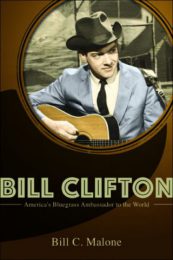The careers of most classical bluegrass musicians in the US more or less resemble each other, except for a few details. The typical biography finds them raised essentially in poverty, born into a family of four or five children, equipped only with the most basic schooling and after some amateur nights in between shifts in a plant or manual jobs, they maybe could record an album or two.
 Mostly, this was the end of the career in music or the artist became a professional and could actually make a living from music; however, this was rather the exception. It is hard to tell how many great talents the world has never heard on record because paying bills and earning money simply had priority.
Mostly, this was the end of the career in music or the artist became a professional and could actually make a living from music; however, this was rather the exception. It is hard to tell how many great talents the world has never heard on record because paying bills and earning money simply had priority.
Now, the biography of country and bluegrass musician Bill Clifton is quite different.
Born as William August Marburg in 1931, he, in fact, came from a wealthy family, earned his MBA degree, joined the Peace Corps and the Marines and most of the time he actually did not need not to worry about his commercial success as an artist to make sure he could pay his bills.
He was very close to A. P. Carter of the Carter family and, seemingly, there he received the recognition and attention his wealthy father, who was much opposed to his son’s musical career and had envisioned a career in banking for him, would never give him. To save his father more embarrassment, William Marbug changed his stage name to “Bill Clifton.” He made six albums for Starday records, met with countless other old time and bluegrass musicians from the Appalachian region, recorded with some of them, had regular radio shows and organized one of the first American open air bluegrass festivals, the “Bluegrass Day of Luray” in 1961.
One or the most important chapters of his biography is his move to England with his entire family in 1963, which was a crucial year in the development of the English music scene that at this time produced a number of important styles that later would be known as folk, skiffle and beat music. Fellow American folklore fan and collector Alan Lomax arrived in England in 1950 and occasionally hosted a BBC radio show where he made bluegrass music popular for a huge number of people.
So from all the American folk and bluegrass musicians Clifton was probably the most popular in Europe. Furthermore, from his new home in England, he made many excursions to Holland, Sweden, Germany and to regions as remote as Russia, always traveling with a big bus and earning money by performing in countless small clubs along the way.
It is hard to tell, but Clifton today may actually be remembered more as the “Bluegrass Ambassador,” so the fitting long title to this book, than as an outstanding inventor and performer. Needless to say that this role as a promoter, musician and eyewitness to this peculiar American music style too, was of tremendous importance, and it could be compared with the activities of a John Peel or a John Hammond for other musical styles. If not for this reason, his songbook “150 Old Time Folk and Gospel Songs” which he published in 1955 became some sort of “the good/real book of bluegrass” and will forever connect his name with the music.
Author Bill C. Malone is one of the most prolific writers on folk and country music; a musician himself, he has made a strong impression with his book Don‘t Get above Your Raisin‘, now a standard text on country music.
Review by Dr. A. Ebert © 2017
Bill C. Malone. Bill Clifton: America’s Bluegrass Ambassador to the World (Music in American Life). University of Illinois Press, 2016, 184 p.
